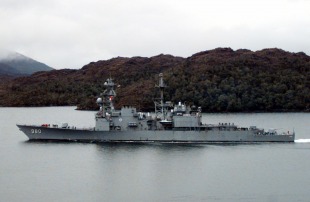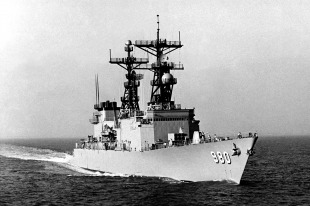Эсминец USS Moosbrugger (DD-980)
Основная информация
Главные размерения
Машина
- 4 * General Electric LM2500 gas turbines
- 2 * shafts, 80,000 shp (60 MW)
Персонал
Боевые силы и средства
- AN/SPS-40 air search radar
- AN/SPG-60 fire control radar
- AN/SPS-55 surface search radar
- AN/SPQ-9 gun fire control radar
- Mark 23 TAS automatic detection and tracking radar
- AN/SPS-65 Missile fire control radar
- AN/SQS-53 bow mounted Active sonar
- AN/SQR-19 TACTAS towed array Passive sonar
- Naval Tactical Data System
- AN/SLQ-32 Electronic Warfare System
- AN/SLQ-25 Nixie Torpedo Countermeasures
- Mark 36 SRBOC Decoy Launching System
- AN/SLQ-49 Inflatable Decoys
- 2 * 5 in (127 mm) 54 calibre Mark 45 dual purpose guns
- 2 * 20 mm Phalanx CIWS Mark 15 guns
- 1 * 8 cell ASROC launcher (removed)
- 1 * 8 cell NATO Sea Sparrow Mark 29 missile launcher
- 2 * quadruple Harpoon missile canisters
- 2 * Mark 32 triple 12.75 in (324 mm) torpedo tubes (Mk 46 torpedoes)
- 1 * 61 cell Mk 41 VLS launcher for Tomahawk missiles
- 2 * Sikorsky SH-60 Seahawk LAMPS III helicopters
The USS Moosbrugger (DD-980), a Spruance-class destroyer constructed by the Ingalls Shipbuilding Division of Litton Industries in Pascagoula, Mississippi, was lovingly referred to as the «Moose» by its crews. It was named in honor of Vice Admiral Frederick Moosbrugger, renowned for his outstanding leadership of destroyer squadrons during World War II.
Laid down on 3 November 1975, the ship was launched on 23 July 1977, and eventually commissioned on 16 December 1978. Upon arrival at Charleston, South Carolina, just before Christmas in 1978, Moosbrugger became the inaugural vessel of her class at that base. The ship underwent shakedown exercises at the Fleet Training Center in Guantanamo Bay, Cuba, and made visits to Port-au-Prince, Haiti, and Saint Thomas, United States Virgin Islands during this period.
Following the shakedown, Moosbrugger returned to its builders for post-commissioning modifications and enhancements. While in Pascagoula, an emergency sortie was conducted to avoid Hurricane Frederic's wrath, spending several days in the Gulf of Mexico until the storm subsided. Upon return, the ship provided electrical power to parts of the shipyard to aid in completing its refit. During this refit, a pair of moose antlers was installed on the ship, positioned just below the bridge windows.
Moosbrugger set sail for the Mediterranean Sea on 14 July 1980, serving as the flagship for Commander, Destroyer Squadron 20 throughout the deployment. It engaged in anti-submarine warfare (ASW) and provided support for amphibious operations. Port calls included stops at Rota, Spain, Naples, Italy, Cagliari, Italy, La Spezia, Italy, Marseilles, France, Benidorm, Spain, Cartagena, Spain, and Palma de Mallorca. Returning on 11 December 1980, it served as the test platform for the AN/SQR 19(V) tactical towed array sonar (TACTAS) in 1982.
For exceptional service in naval operations from 13 September 1986 to 1 December 1986, Moosbrugger received the Meritorious Unit Commendation (MUC). The ship showcased remarkable skills and tactical proficiency in ASW operations against Soviet submarines in the Mediterranean Sea, achieving unparalleled success in their detection, tracking, and classification. The commendation lauded Moosbrugger's pivotal role in enhancing national and NATO's ASW capabilities, setting a new benchmark for surface-ship ASW excellence.
In 1989, Moosbrugger undertook its final Cold War deployment to the United States Sixth Fleet, serving as the primary ASW element of the USS Theodore Roosevelt Battle Group.
In August 1990, as part of the initial United States response to Saddam Hussein's invasion of Kuwait, Moosbrugger deployed within six days for Operation Desert Shield. It played a crucial role in enforcing UN Iraq Sanctions, conducting visit, board, search, and seizure (VBSS) operations to prevent war materials from reaching Iraq. The ship was awarded the Navy Unit Commendation for its service during the Persian Gulf War.
Moosbrugger underwent an extensive update in Charleston shipyard, replacing its forward anti-submarine missile launcher with the RUM-139 VL-ASROC vertical launching system (VLS), allowing it to fire Tomahawk missiles in addition to vertically launched ASROC.
Relocating to Mayport, Florida, on 11 March 1995, Moosbrugger became one of the first surface warships to house women on board. The yard period in Mayport aimed to address extensive issues encountered during the prior overhaul in Charleston.
Following these overhauls, Moosbrugger deployed in 1996 and 1998, taking part in UNITAS exercises, engaging in combined tactical operations, amphibious exercises, and in-port maneuvers with South American naval forces.
Ultimately, Moosbrugger was decommissioned on 15 December 2000 and brought to the Philadelphia Naval Intermediate Ship Maintenance Facility. It remained in Maintenance Category B for activation in times of national emergency until 2006 when it was towed to Brownsville, Texas, for dismantling.
The official crest of USS Moosbrugger honors Vice Admiral Frederick Moosbrugger's dedication and courage during World War II, commemorating the Battle of Vella Gulf in the South Pacific. The crest symbolizes the ship's legacy, showcasing its motto «More than Required» and commemorating the notable achievements of its namesake.
- Комментарии
 ru
ru en
en uk
uk




 Военно-Морские Силы США
Военно-Морские Силы США Ingalls Shipbuilding
Ingalls Shipbuilding